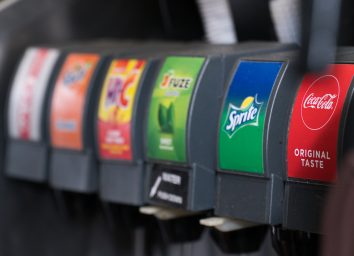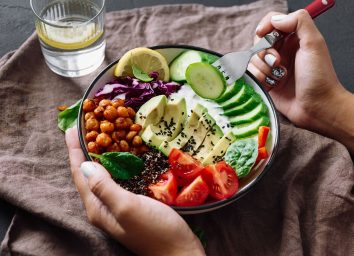Drinking Habits You Must Follow If Alzheimer's Runs In Your Family

Having a family member who has or had a diagnosis of Alzheimer's disease (AD) can be devastating, as watching a loved one slowly lose their memory or becoming confused can be truly heartbreaking.
Unfortunately, developing Alzheimer's Disease is quite common, with the number of people living with the disease doubling every 5 years beyond age 65, according to the Center for Disease Control and Prevention. This number is estimated to nearly triple to 14 million people developing Alzheimer's Disease by 2060. Clearly, finding ways to combat this disease is of the utmost importance.
More unfortunate news—if you have a family member with Alzheimer's disease, your chances of developing this disease increase.
Now for some good news—the foods you eat and the beverages you drink can play a role in reducing your risk of developing Alzheimer's disease, as long as you are making the right choices.
Many know that foods like blueberries and walnuts are brain health superstars. But many don't realize that the liquids we include in our diet can be just as impactful as the foods that we eat when it comes to brain health.
If you have a family member with Alzheimer's disease, here are some drinking habits you must follow if you want to do all that you can to keep your own brain health in tip-top shape. Read on, and for more on how to eat healthy, don't miss The #1 Best Juice to Drink Every Day, Says Science.
If you drink alcohol, limit your intake to avoid excessive consumption.

If you enjoy a cocktail every once in a while, there doesn't appear to be a need to avoid your favorite boozy drink altogether if you are trying to reduce your Alzheimer's disease risk.
Overconsumption of alcohol, on the other hand, appears to have detrimental effects on Alzheimer's disease development, at least according to data published in the British Medical Journal. According to these results, those who drank more than 14 units of alcohol per week were at an increased risk for developing Alzheimer's disease vs. those who drank fewer than that amount. Interestingly, avoiding alcohol did not appear to offer any additional protective benefits for AD risk.
Abstaining from alcohol and then binging once in a while doesn't appear to be the best solution when trying to stick to that maximum quota. It seems better to enjoy daily low-quantity drinking instead of infrequent binge drinking when it comes to AD risk reduction. So, a daily glass of wine or an occasional beer when watching sports may be a-ok. Doing keg stands or taking multiple shots at the bar? Not so much.
Include 100% orange juice in your diet.
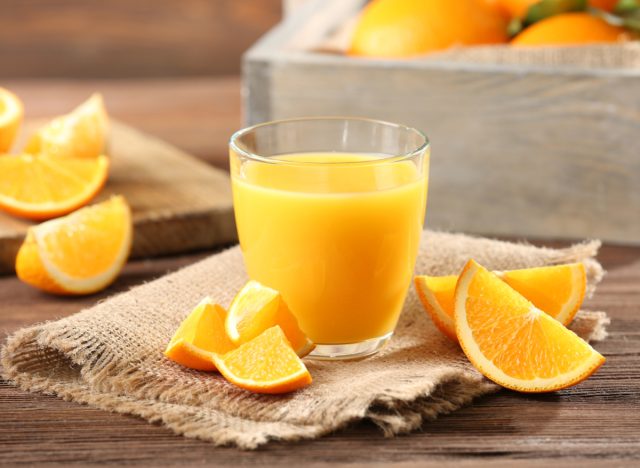
Most people are happy to start their day with a glass of 100% orange juice, knowing that this practice can give people a boost of immune-supporting vitamin C. Less known is that drinking a glass of OJ may do your brain health some good too.
Orange juice naturally contains many brain health-supporting nutrients, including flavonoids (such as hesperidin), thiamin, and vitamin B6.
Of course, one of the shining stars of OJ is vitamin C, a nutrient that many have a protective function against age-related cognitive decline and Alzheimer's disease. And the hesperidin may help maintain healthy blood pressure, which can help reduce AD risk, as hypertension increases the risk of AD.
Specific data show that men who drank orange juice every day were 47 percent less likely to develop poor thinking skills than the men who drank less than one serving per month.
While OJ is thought of as a breakfast drink, there is no reason why it can't be enjoyed any time of the day. Including this classic citrus drink in your overall healthy diet is one very simple way to support your cognitive health naturally.
Sip on true teas.
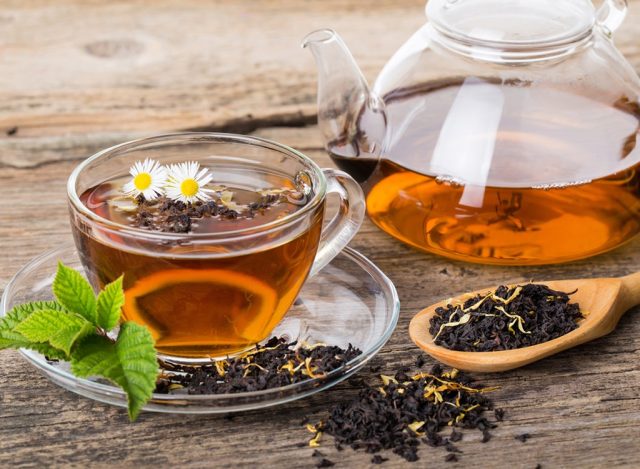
These days, there are many teas that are soothing to sip and delicious to taste. And while including any tea in your diet is unlikely to come with any downside, sticking to true teas (like black, green, and oolong), may offer a unique benefit for cognitive health.
According to data published in the Journal of Nutrition, Health, and Aging, frequent intake of true tea is linked to a lower risk of dementia, especially for people who are genetically predisposed to the disease (like people with a family member with this disease). Tea leaves have bioactive compounds, such as flavonoids, which offer anti-inflammatory and antioxidant activity. Plus, they contain L-theanine, an amino acid that helps regulate brain activities.
Just watch your sugar addition, as excessive sugar intake can increase AD risk in some instances.
Swap your sugary drinks for low sugar alternatives.
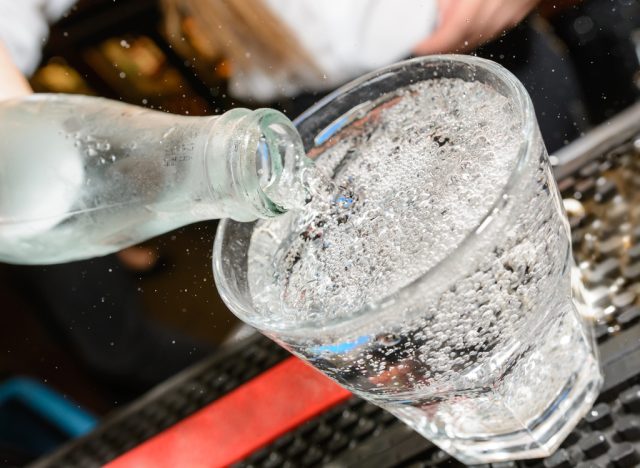
Undoubtedly, indulging in a sugary soda is utterly satisfying on a warm summer day. But too many sugary drinks (like soda) can up your risk of developing Alzheimer's disease, making it a habit you want to break ASAP if you have a family member with this condition.
In fact, consuming one to seven servings of sugar-sweetened beverages, like soda, per week made participants in a Journal of Prevention of Alzheimer's Disease study 1.91 times more likely to develop AD compared to those who refrained from sugar-sweetened beverages. Specifically, an estimated increase of 10 grams per day in total sugar intake (about 2.4 teaspoons) is associated with an increased AD risk by 1.3-1.4%, according to results of a different study published in Nutritional Neuroscience.
If you love the effervescence of soda, try sparkling water with a hint of flavor for a satisfying swap that is much better for your brain.
Try green juice.
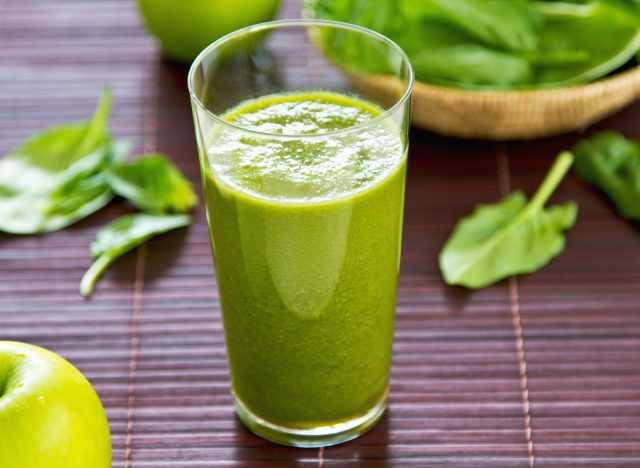
If you are trying to reduce your AD risk, try sipping on green juice. Juicing veggies like kale and spinach helps you consume some of the foods recommended by the MIND diet, an evidence-based diet that supports brain health.
Kale, in particular, contains kaempferol, a flavonoid that may play a role in AD risk reduction. According to data published in Neurology, those in the top 20% in kaempferol intake had a 50% lower rate of developing Alzheimer's disease than those in the bottom 20% of intake.
Not a green juice fan? Add some greens to your smoothies for a more substantial sippable solution.


